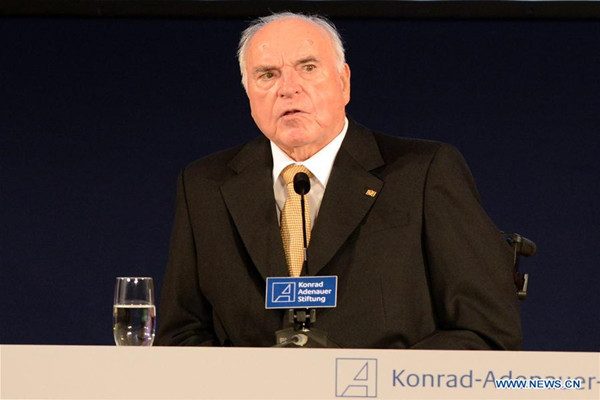A friend of China, Helmut Kohl, passes away
- By George N. Tzogopoulos
 0 Comment(s)
0 Comment(s) Print
Print E-mail China.org.cn, June 19, 2017
E-mail China.org.cn, June 19, 2017
|
|
|
File photo taken Sept. 27, 2012 shows former German Chancellor Helmut Kohl speaks at an event marking his 30th anniversary of coming to power in Berlin, Germany. Former German Chancellor Helmut Kohl died at his home in Germany's Ludwigshafen on June 16, 2017 at the age of 87, according to German local media Focus Online. [Photo/Xinhua] |
Last Friday, former German Chancellor Helmut Kohl passed away. Most international leaders sent condolences to President Frank-Walter Steinmeier and Chancellor Angela Merkel for this significant loss.
Chinese President Xi Jinping and Premier Li Keqiang were no exception. Kohl was regarded as a good friend of China, as Sino-German relations were significantly advanced during his administration, as President Xi stressed in his message.
Governing his country for 16 years, from 1982 until 1998, Kohl seriously looked to the East. In so doing, he had the opportunity to visit China five times while meetings between other ministers of the two sides were frequent.
Diagnosing that Beijing's economic boom and opening-up process could bring benefits to Germany, his visits always involved an accompanying large business delegation seeking to increase bilateral trade and boost investments. His prognosis and choice have been proven correct in the medium- and long-term.
His 1993 and 1995 visits, for instance, were remarkable for their tangible economic results and the doors they opened for a new wave of close collaboration. In 1995, Kohl also became the first Western leader to visit a Chinese military base after 1989. This symbolical move outlined his "out-of-the-box" thinking about China in a period of different foreign policy priorities for most Western leaders.
Notwithstanding the importance of his international approach, Kohl's legacy cannot be disassociated from domestic developments. The country he first led at the end of 1982 was completely different from the one he handed over to his successor in 1998.
The end of the Cold War reshaped the landscape of world politics and had a tremendous impact on Germany. Divided into a Western and an Eastern bloc politically, and then physically by the Berlin Wall, , the country could finally work towards reunification.
The reasons for the end of the Cold War are deep-rooted and are certainly related with the implications of the perestroika policy of Soviet President Mikhail Gorbachev. But when Kohl met him in Bonn a few months earlier, the fall of the Berlin Wall could not have been anticipated.
The demise of the Soviet Union, however, helped Kohl win the election of 1990 presenting himself a guarantor of stability. But his next task was Herculean. There was a vast gap in living conditions between the Western and Eastern parts.
Mentalities were different. And memories could not easily ne erased from the trauma of the Cold War era and the division of people and, indeed many families. So, Kohl had to inspire citizens living in the East that they could follow the path of the West without being left behind.
His plan included placing some of the economic onus on Western Germans to show their solidarity with their Eastern compatriots. The principal objective was to generate growth and development on the other side.
Critics of Kohl have accused him for not doing enough to improve living conditions of Eastern Germans and eliminate problems such as unemployment and poverty. This criticism is unfair.
Of course, an assessment of the situation more than two decades later can certainly lead to the finding of omissions and mistakes. Kohl had to act under pressure, though. The reality is that he achieved his country's unity and set the basis for its future economic explosion under extremely difficult circumstances.
Moreover, a reference to Kohl's contribution to the European integration project needs to be made. Even during the Cold War, he never hid his belief that Europe had bright prospects for unity and enlargement.
He closely cooperated with French President François Mitterrand. Together the two leaders were the pioneers of all steps enhancing European integration after the fall of the Berlin Wall, mainly of the creation of the economic and the monetary union.
Again, some critics argue that Germany's present perceived "hegemonic" role in Europe began with Kohl. At that time, he was only saying that Germany had no ambition to become a world power. And if, nowadays, Germany is becoming Europe's superpower in fact, this cannot necessarily be related to Kohl's initial calculations and should be also attributed to the decline of other countries. In the final analysis, he cannot be blamed for economic and political successes.
All in all, Helmut Kohl was one of the most important European statesmen in recent decades. The modern history of Germany and Europe will remain associated with his legacy forever. This is also the case for the steady and systematic improvement of relations between Germany – and more broadly Europe – and China.
George N. Tzogopoulos is a columnist with China.org.cn. For more information please visit:
http://www.china.org.cn/opinion/GeorgeNTzogopoulos.htm
Opinion articles reflect the views of their authors, not necessarily those of China.org.cn.







Go to Forum >>0 Comment(s)